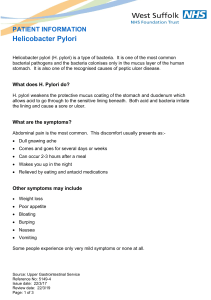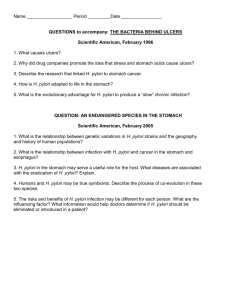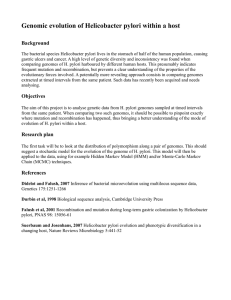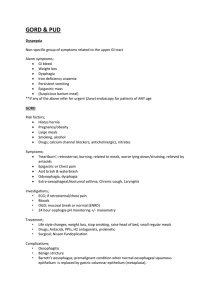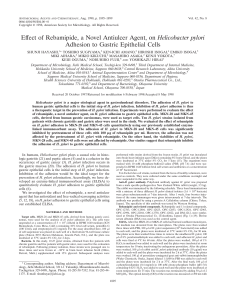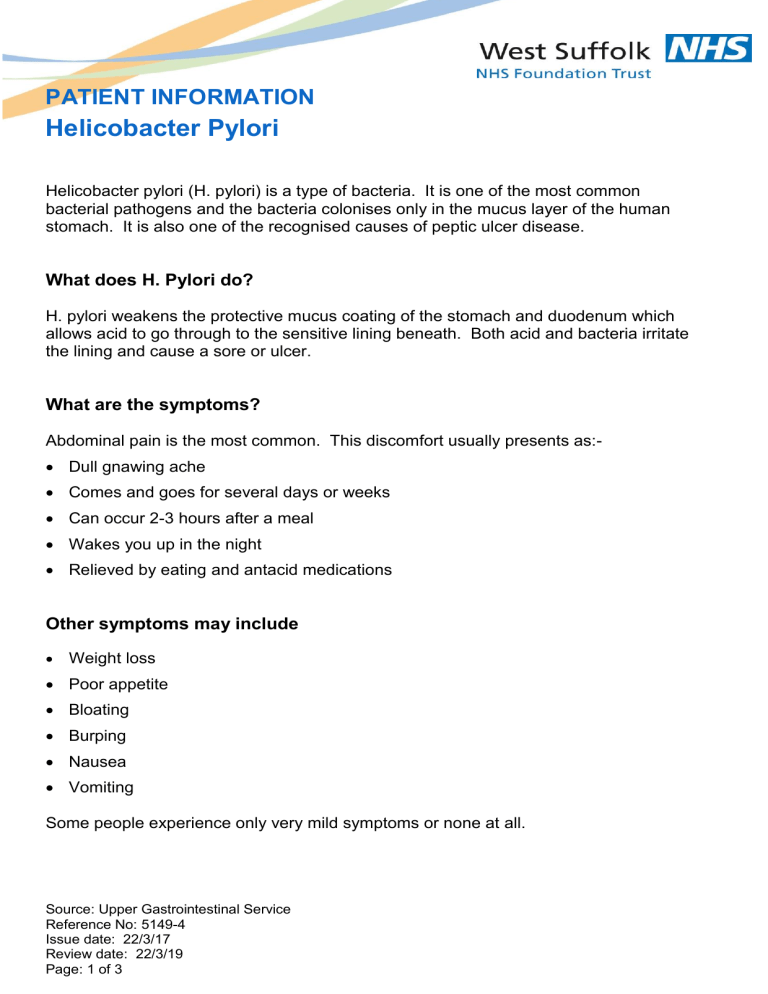
PATIENT INFORMATION Helicobacter Pylori Helicobacter pylori (H. pylori) is a type of bacteria. It is one of the most common bacterial pathogens and the bacteria colonises only in the mucus layer of the human stomach. It is also one of the recognised causes of peptic ulcer disease. What does H. Pylori do? H. pylori weakens the protective mucus coating of the stomach and duodenum which allows acid to go through to the sensitive lining beneath. Both acid and bacteria irritate the lining and cause a sore or ulcer. What are the symptoms? Abdominal pain is the most common. This discomfort usually presents as: Dull gnawing ache Comes and goes for several days or weeks Can occur 2-3 hours after a meal Wakes you up in the night Relieved by eating and antacid medications Other symptoms may include Weight loss Poor appetite Bloating Burping Nausea Vomiting Some people experience only very mild symptoms or none at all. Source: Upper Gastrointestinal Service Reference No: 5149-4 Issue date: 22/3/17 Review date: 22/3/19 Page: 1 of 3 How do you diagnose H. Pylori? H. pylori can be detected at endoscopy. This is when a scope with a camera is passed through your mouth and into your stomach. Biopsies can be taken of the lining of your stomach and tested for H. pylori. A sample of your blood, breath or stool can also detect H. pylori. The most common test performed is the stool test. It is important to note that these tests for H. pylori may be falsely negative in patients who have taken antibiotics, bismuth compounds or omeprazole in the past. How do you treat H. Pylori? A combination of tablets will be given to you to eradicate the H.pylori bacteria. The drugs used to treat the bacteria include: Proton pump inhibitors, which inhibit and suppress acid production. These may be either omeprazole, lansoprazole, rabeprazole, esomeprazole or pantoprazole. Plus a combination of antibiotics, either metronidazole, tetracycline, clarithromycin, amoxycillin. The proven effective length of treatment is a one week course called Triple Therapy. The therapy may be difficult to take as it involves taking a lot of tablets, some of which may cause side-effects such as nausea, vomiting, diarrhoea, dark stools, metallic taste in the mouth, dizziness, headache and yeast (candida) infections in women. Most sideeffects will stop once treatment has discontinued. However, occasionally the course of antibiotics is extended to two weeks. You will need to continue the proton pump inhibitors for up to six weeks longer, if the endoscopy has shown a peptic ulcer, to allow the ulcer to heal. We may also need to repeat the endoscopy to check that it has healed, and that helicobacter has been eradicated successfully. Can H. Pylori be prevented? No one knows for sure how H. Pylori spreads, so prevention is difficult. Researchers are trying to develop a vaccine to prevent infection. If you require any further advice please contact your GP. If you would like any information regarding access to the West Suffolk Hospital and its facilities please visit the disabledgo website link below: Source: Upper Gastrointestinal Service Reference No: 5149-4 Issue date: 22/3/17 Review date: 22/3/19 Page: 2 of 3 http://www.disabledgo.com/organisations/west-suffolk-nhs-foundation-trust/main © West Suffolk NHS Foundation Trust Source: Upper Gastrointestinal Service Reference No: 5149-4 Issue date: 22/3/17 Review date: 22/3/19 Page: 3 of 3
